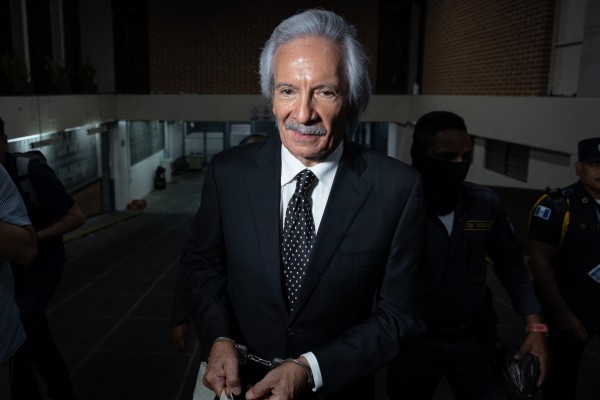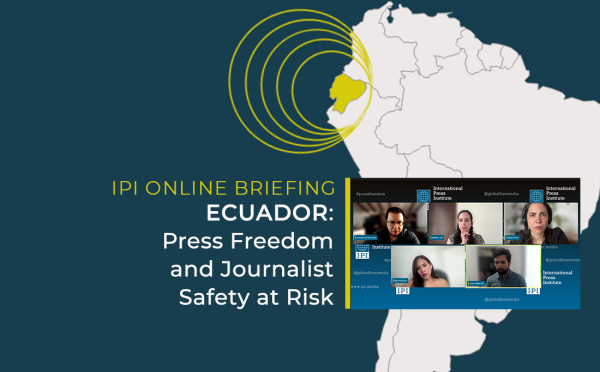Prominent Mexican journalist Miguel Angel Lopez Velasco was shot to death along with his wife and son by gunmen who broke into their home in the city of Veracruz early Monday morning.
A motive for the murders has not been determined, but Lopez Velasco’s role as the editor of newspaper Notiver established him as a well known figure, and possible target, in the state of Veracruz.
Lopez Velasco, 55, also wrote a regular column called “Va de Nuez” under the pseudonym Milo Vela focusing on local government corruption, drug trafficking and crime.
According to a report by Notiver, the armed assailants smashed through the front door of the home around 5:30 in the morning while Lopez Velasco, his wife Agustina and their 21-year-old son Misael slept. The newspaper called for an immediate investigation into the triple murder and demanded that the perpetrators be punished with the “full weight of the law.”
International Press Institute (IPI) Press Freedom & Communications Manager Anthony Mills said: “We are appalled at the barbarity of this act. Not only has crime journalist Miguel Angel Lopez Velasco apparently paid with his life for his reporting on organised crime, but so have his wife and child. The chilling callousness with which these murders were carried out tragically highlights the plight of journalists in Mexico today, where the rule of law is absent and impunity reigns supreme.”
Lopez Velasco is the second journalist killed in the state of Veracruz and the sixth in Mexico in 2011.
Pablo Ruelas Barraza, 38, was found on June 13 in Huatabampo, a small town in the northern Sonora state. The local press reported that he was shot to death after he tried to resist being kidnapped by two individuals. His articles had been published in El Diario del Yanqui and El Regional de Sonora. According to regional media, he had received death threats from both criminal groups and from local authorities.
Ruelas had been imprisoned for five years for “crimes against health”, a phrase Mexican authorities use to describe drug-related crimes. Nevertheless, Reporters without Borders called on authorities to not dismiss the role his profession may have played in the crime.
“We found that … the Attorney General of Sonora state has emphasised the victim’s criminal record. For as real as they may be, the sentences should not serve as a pretext to conclude the investigation in any hurry,” the organization said.
Earlier this month, the body of Noel Lopez Olguin, a reporter for weekly newspapers Horizonte, Noticias de Acayucan and the daily La Verdad, was found in the city of Chinameca three months after his disappearance. Media worker Rodolfo Ochoa, and journalists Jose Luis Cerda Melendez and Luis Emanuel Ruiz Carrillo, were also brutally murdered earlier this year.
The latest killing further underscored Mexico’s position as one of the most dangerous countries in the world for journalists. According to IPI’s most recent World Press Freedom Review, Mexico, with 12 deaths in 2010, ranked second to Pakistan as the deadliest country for journalists that year.
Unfortunately, with almost six months left in 2011, Lopez Velasco’s death brings the country to that same benchmark. According to IPI’s Death Watch, Mexico now follows only Iraq this year, which has seen seven deaths since 1 January.
Meanwhile, Marco Antonio López Ortiz, news editor of the daily Novedades de Acapulco, has been missing since 7 June. According to eyewitnesses, a group of unidentified assailants intercepted him that evening as he was about to get into his car.
The chairman of the Inter American Press Association (IAPA)’s Committee on Freedom of the Press and Information, Robert Rivard, called on the authorities to take “urgent action to ascertain López’s whereabouts.” He asked the Mexican government to show “greater political will” to put an end to the impunity reigning in the country.
Reporters without Borders also expressed their concern, as two journalists were killed last year in Guerrero state, where López disappeared.
In an unrelated development, the National Center of Social Communication (CENCOS) reported that the daily newspaper Norte, from Ciudad Juárez, alleged that federal police recently attacked and harassed its reporters.
Guadalupe Salcido, the newspaper’s press editor, said that reporter Antonio Flores Shroeder was arrested by the police on 11 June after being followed in April by the security forces. Editorial director Alfredo Quijano was further intercepted that month and photographed with his family. Reporter Pablo Hernández and photographer Ismael Villagomez Tapia were also arrested by the police.
“These events are part of the general climate of harassment and intimidation against the press in Ciudad Juárez,” Salcido commented.


